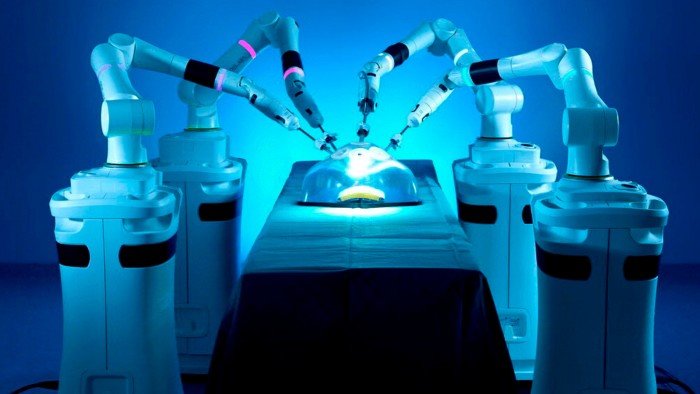Unlock the Editor’s Digest for free
Roula Khalaf, Editor of the FT, selects her favourite stories in this weekly newsletter.
There is a fine view of Ely Cathedral across fields from outside the Cambridgeshire factory of the UK’s leading surgical robotics company. Inside the spotless building, 13,000 parts are assembled into each Versius system used by surgeons for keyhole surgery, with its four robotic arms and 3D-vision console.
This is an exciting time in surgical robotics. The technology is widely used in the US and is spreading around the world as surgeons and hospitals see the medical and financial benefits. The National Health Service announced last week that it will accelerate its use of robotic systems, with 9 out of 10 keyhole procedures assisted by technology within 10 years.
It is also promising for CMR Surgical, a start-up that emerged from the life sciences ring around Cambridge in 2014, and has raised nearly $1bn in investment from private equity backers including SoftBank at a $3bn valuation. CMR is taking on the dominant da Vinci robotic systems produced by the US company Intuitive Surgical with Versius.
So I was disappointed to learn that CMR has hired advisers and could sell itself to a strategic acquirer, rather than pursue Intuitive independently in a market for surgical robotics that could reach $14bn next year, according to the consultancy Oliver Wyman. This would be another sale of a promising UK technology company, following those of Oxford Ionics and Spectris.
I went to Ely to investigate and discovered that there is still hope of CMR remaining independent, but that competition in surgical robotics has broader lessons. It shows that a UK company trying to beat an incumbent enterprise in the largest, most technologically sophisticated healthcare market in the world faces a huge challenge.
Surgeons use systems such as da Vinci, Versius and others made by companies including Medtronic and Asensus Surgical to make it easier to operate precisely on their patients. Robots are used in keyhole operations in which rods with surgical instruments are inserted through small incisions. Surgeons manipulate these robot arms remotely while sitting at electronic consoles nearby.
The idea originated in a US Department of Defense project to explore whether surgeons could operate far from battlefields, but was then adapted for civilian use and Intuitive was founded 30 years ago in Silicon Valley. Some 10,000 da Vinci systems have been installed globally as hospitals invest in robots to reduce complications from surgery and discharge patients faster.
That is an intimidating number, since fewer than 200 Versius systems had been installed by the end of last year. Intuitive also has a big lead over other companies, giving it the advantage that many surgeons have trained on da Vinci robots in specialities such as prostate cancer. Although the systems are expensive, selling for an average $1.6mn last year, they are familiar.
But CMR’s five founders saw a clever way to exploit da Vinci’s weak point of being bulky. The Versius robotic arms are modular, rather than da Vinci’s integrated units, allowing them to be wheeled separately between operating theatres or within a hospital. The system is less advanced than the latest da Vinci 5 model, but offers a versatile alternative.
The UK company is now in the tough phase of scaling from a promising start-up to a global enterprise. There have been bumps: its revenues fell last year because it sold fewer units as its senior management was shaken up. Massimiliano Colella, the new chief executive, told me that while it made a loss of £130mn in 2024, it has “a clear path to profitability, not far away”.
His investors would then have “all options”: whether to hold on to the company, float publicly or sell it. Meanwhile, it faces another question: how much to commit to breaking into the US market, where Versius has gained approval for gallbladder surgery. That is a great opportunity but it would require heavy investment to roll out Versius to thousands of US hospitals.
My fear is that, given the choice of accepting an immediate reward or taking a risk on transformative success, they will settle for the former. This would be reasonable: were CMR to achieve the whispered sale price of $4bn, it would be a very good outcome for a Cambridge start-up. It would also be a prudent choice: take the win and do not flirt with hubris.
But it would be another case of British technological imagination not being equalled by business ambition. It is easier to start a company first in the US and conquer the rest of the world later than the reverse. But if UK companies don’t believe in themselves, who else will?
john.gapper@ft.com
